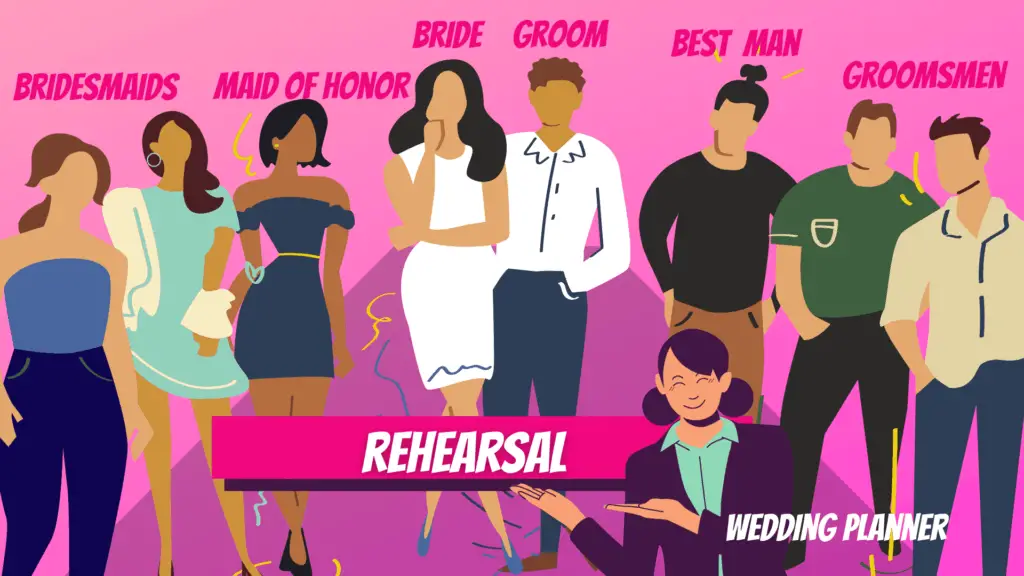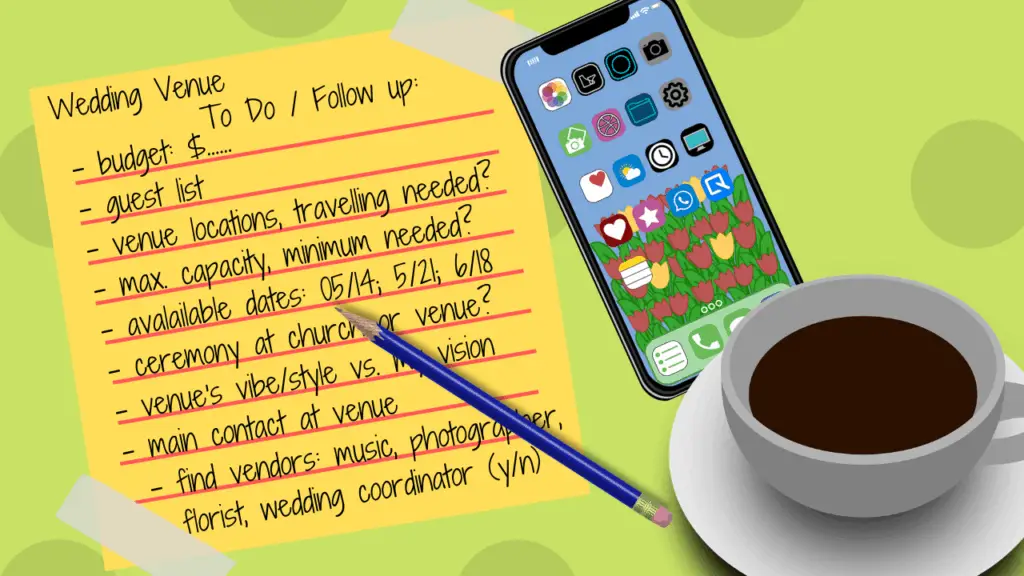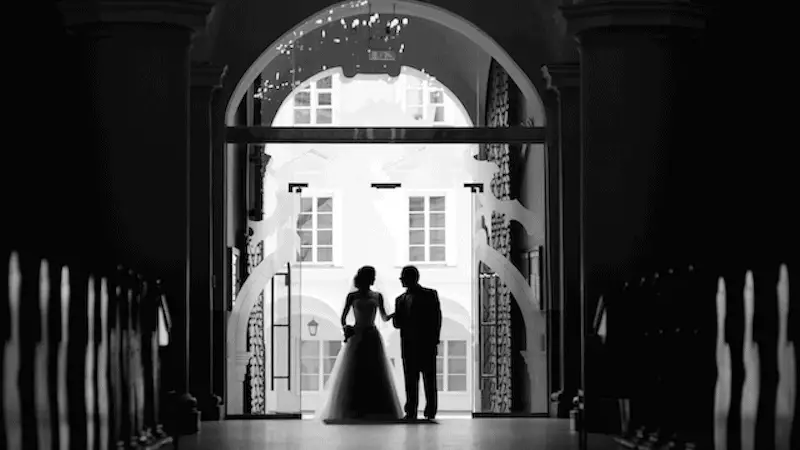27 Questions To Ask Before You Hire A Wedding Planner
Planning a wedding can be overwhelming. Unless you are able to hire one, you will evolve into your own wedding planner.
But being an event coordinator is one of the most stressful occupations that you can find. Particularly if you already have a full-time job, it can be daunting to take on another task, especially when it is so demanding, like planning a wedding.
It’s okay to feel a little apprehensive before you start planning out the finer details on your own. As long as you stay organized, have your venue booked, vendors lined up, and work with experienced professionals, everything will fall into place just fine.
However, if you are stressed out and need support, hire a wedding planner to lay out the foundation and logistical details with you.
Wedding planners do what?
Professional wedding planners are experts in their field. They offer personalized, one-on-one consultations and assist you through the entire process of planning your wedding.
Wedding planners provide services such as:
- helping you to select a venue
- conduct walkthroughs
- assist in picking and managing vendors
- analyze and explain contracts if requested
- help to explain costs to create a realistic budget
- aid with menu planning
- create seating arrangements and floorplans
- create timelines and keep you on top of your schedule
- help to communicate with venues and vendors
- arrange for transportation
- provide hands-on assistance and management on the day of your wedding
Since your wedding is an incredibly personal celebration, you want to choose a wedding planner you really like and who gets you. You will be working together side by side for months to come.
Key Questions To Ask A Wedding Planner
1. Are you available on the date of my wedding?
This is the first question you want to ask. Otherwise, you may as well go on to the next one on your list.
However, if you want to work with a certain wedding planner because of their great reputation and prestige and are willing to move your date for them, it may be worth seeing whether alternative dates are available at your wedding venue.
2. How many weddings have you planned?
You want to inquire about their experience level by asking how many weddings they have previously done, as well as how many weddings they typically do in a year.
Wedding planners can get overwhelmed, too. If they’re in charge of numerous weddings simultaneously, you may not always be able to reach them since they’ll have to allot their attention.
3. Are you familiar with my wedding venue, or did events at comparable ones?
If they have worked weddings there before it is a great benefit. But a seasoned wedding planner will adjust to any venue if you have already picked a location.
And if you are still looking for a wedding venue, take advantage of your planner’s knowledge who will send you to see venues where they have organized successful events in the past.
This is actually a massive plus for you since you gain access to their tried and tested network of venues, caterers, florists, etc. that they have established relationships over the years.
4. How did they get into wedding planning?
What is the wedding planner’s background?
Wedding planners often come from a wide range of professional backgrounds. Their experience might be rooted in the hospitality industry, or they may have started out by having planned their own wedding. Some started in design or entertainment, while others transitioned into event planning from academia.
When you’re considering which expert to hire, take into account their personal experience and curriculum to get an idea of what they would excel at helping you with.
5. How are your services structured in terms of pricing and action steps leading up to the day of my wedding?
Be upfront and honest with your budget and ask the wedding planner if they can work with it. This gives them a better starting point to illustrate their pricing and service structure.
- Would the wedding planner be paid in tiers of services or cost per hour/day/weekend/monthly fee?
- Do they offer a full-package situation leading you through the entire event from start to finish?
- What kind of consulting action steps are involved leading up to the day of your wedding?
- What type of package opportunities are available?
- How long does their service last on the day of your wedding, i.e., until the ceremony begins or through the end of the wedding? Would it include overseeing the vendors setting up at the venue, and breaking down the wedding, leaving the venue behind in good order?
- What parts of the wedding would you need to take care of that the wedding planner wouldn’t handle?
A word of advice: a wedding planner’s job is not to be your go-to source to find you the cheapest deals in town.
They have a keen awareness of what is possible in the current market. Their industry connections are usually with the best vendors in your region, and they will let you know what your options are.
Take the approach that you are hiring a manager rather than the cheapest deal finder.
6. Can I see a sample contract with pricing included before signing it?
Many wedding planners include helping you with the wedding venues’ and vendors’ contracts.
When it comes to their contract, ask if you can see an example if you believe it will help you with making a decision.
Asking them for a sample copy of their agreement will help you understand what you would need to commit to.
You will be able to fully understand what they are offering, dissect any concerns you may have, and compare their services with others before making a decision.
7. Who will be my point of contact?
Wedding planners are often a one-person operation, and they’ll work exclusively with you throughout the wedding planning process.
If your wedding is more complex, planners often hire assistants to support certain tasks. You would, at the very latest, meet them on your big day.
If you have hired a larger wedding planner team, be sure to ask who your designated point of contact will be.
- Do they have an office, what is the location, and what hours do they operate?
- What is the best way to communicate? Via phone, emails, texting, Zoom, or in-person meetings?
8. Can we talk to a couple who recently used your services?
If you’re getting cold feet, see if your wedding planner would be open to you talking with one of their recent clients about their experience. This can offer some valuable insight and help you make a more informed decision.
However, if you are dealing with a well-respected wedding planner, this inquiry may come over as insulting.

9. Do you have a great example of how you handled a difficult situation and how you solved the problem?
Even a perfectly planned event can encounter some glitches entirely out of the wedding planner’s, venue’s, or vendor’s control. Check with the planner if they had ever dealt with unexpected setbacks and how they handled the situation.
10. What is your cancellation policy if something were to happen and we had to cancel our event after booking with you but before the date has passed?
Is there a fee associated with canceling once booked as well as a penalty for late cancellations per month out from the event date (e.g., $xx per month starting one month out from the event)? Are there any exceptions such as illness or family emergencies that would allow us to cancel?
11. What happens if we change our minds about hiring you after signing the contract- will there be penalties or fees to break it off early?
It’s an uncomfortable question to ask, but things can happen. If you find out at some point that you do not see eye to eye with your wedding planner and it’s beyond repair, is there an escape clause in the contract that would let you walk away?
12. Will we receive a copy of all contracts, including those that are non-negotiable, before signing them?
You should clarify that you want to be involved in reviewing all contracts that pertain to your wallet and get copies. This is important as you would want the ability to cross-check and run your numbers simultaneously to correspond with the wedding planner’s math.
13. Will you provide an initial estimate on cost upfront, including all taxes and other costs that may incur during the planning process?
For instance, the estimate should include these items but is not limited to:
- Wedding planner’s fee
- Venue’s costs: food and beverage package, plus venue fee & possible labor costs
- If applicable, fees for renting chairs, tables, dance floor, lighting, props, linens
- Florist
- Entertainment (Band or DJ, musicians for the ceremony)
- Photographer / Videographer
- Ensure the estimate includes possible set up and tear down fees and review overtime fees that vendors may tag on.
14. How much of a deposit is required?
Find out how much downpayment is required when booking to secure the date and how much final payment you’ll need to give for all services before the event.
15. Can I see some of the events you’ve done before getting an idea of what my event might look like if I hire you as my wedding planner?
You need someone who understands your vision and can help you bring it into life. Let the wedding planner show you their portfolio. It will give you an idea of whether you feel the wedding planner can capture your vision or inspire you to something you did not have in your idea book.
16. How often will we meet, and how will we be working together?
You want to get a concept of how the weeks and months fill in with in-person meetings leading up to the wedding.
- When and where will you be meeting with vendors (i.e., florists, music, photographer, etc.) and the catering manager at the wedding venue?
- Will the wedding planner be present when you meet with vendors?
17. Will you communicate on my behalf on all aspects with the wedding venue and vendors moving forward?
Hiring a wedding planner can be a lifesaver if you are not the type of person who likes to negotiate and delegate. It would probably be your first time working with professionals you don’t usually work with daily.
Considering the services you have arranged with the wedding planner, find out if they would be handling all communication or if you would share any interaction with the wedding venue or vendors.
In any event, you should keep personally in touch with the catering sales manager at the venue and specific vendors regardless of your wedding planner as the main person of contact, even if it seems counterproductive to what your wedding planner was hired to do. The more you remove yourself from the people who will run your wedding, the more impersonal and pretended the overall vibe could become since they do not know you in person and you did not build a relationship for them to go the extra mile.
18. Will you handle all follow-ups with the vendors and payments?
Another great thing about hiring a wedding planner could be that they would handle time-consuming follow-ups and logistics with your florist, band or DJ, possible rental companies, photographer, officiant, musicians for the ceremony, and a whole plethora of possible vendors.
When it comes to payments, find out if you would pay each vendor directly or if the wedding planner would handle the payments.
Find out what deadlines you have to keep for each payment. Venues, for example, would, in most cases, be prepaid in full at least two weeks before the wedding. Some vendors may be fully paid the night of the wedding, and some may accept sending you an invoice. It largely depends on each vendor’s business model.
19. Do we have to use your vendors only?
Wedding planners typically rely on using an infrastructure of vendors with whom they have established a positive relationship over the years. Each side knows precisely what the other is doing and is a reliable partner to put your wedding together. However, don’t be shy to suggest vendors that you may know or have seen at other weddings who capture your vibe. If the wedding planner is not enthused to work with them, ask why.
20. Will you handle overnight reservations at the venue or neighboring hotels and help arrange pricing for a wedding room block?
The chances are that you will have some out-of-town guests attending your wedding who need overnight rooms or guests who just like to make it a long weekend and possibly attend your wedding brunch if you are hosting one the next day.
Check if it’s part of your wedding planner’s service package to help to obtain special wedding room block rates for your guests and handle rooming lists with the hotel’s front office.
- If you are providing welcome bags/favors for your guests, check if your wedding planner would take over the logistics for them and even come up with some fun ideas. The welcome bags would need to be given out by the front office staff as guests check-in or be placed in their rooms.
21. Do you handle the guest list, mailing the invitations, and handling and synchronizing the RSVPs (répondez s’il vous plaît) with seating arrangements?
Naturally, you would need to know who you will be inviting to your wedding, but if working with spreadsheets is not your favorite thing, your wedding planner may include this in their services.
Wedding professionals have systems and processes in place to streamline and organize your guest list. Your guest list is a big project that will keep you busy until the wedding day until literally everyone is seated for dinner. It needs to be fail-proof with little to no room for error, especially when it comes to seating arrangements. Once you are, for example, moving 250 guests from the cocktail reception into the ballroom and guests are looking for their table and seats, it’s a train you cannot stop.

22. Will you help with the wedding rehearsal on the evening before the wedding?
A rehearsal for your wedding ceremony before the big day is essential if you wish to have a little less stress on your wedding day. If it is part of their service, your wedding planner or their assistant will take over this part of your wedding. The wedding rehearsal will be a step-by-step process of who will be walking down the aisle in a predetermined sequence, establishing how the bridal party is positioned in front of the room, and running through the recessional.
23. Will you personally handle the ceremony?
You would typically expect that your wedding planner will be handling your ceremony. It is one of the most critical moments of your entire wedding, and it will give you a sense of security to know who will be lining you up and time the processional as you have rehearsed it. Sometimes you see this portion handed over to the on-site catering manager or staff or the wedding planner’s assistant. So make sure you know.
24. What kind of unexpected fees could incur?
Sometimes, you were not aware of expenses that could incur as they rise on a need-to-know basis. They could be self-evident to the industry professionals but may only be mentioned later. Just to include a few of these here, check if you would need to cover any travel expenses, special gratuities, parking, overnight accommodations, food, and beverages (vendor meals) for anyone involved working at your wedding.

25. Will you be on-site at the wedding venue to supervise the vendors and coordinate the delivery of rentals, flowers, entertainment, photographer, placements, and setup of all these with the venue’s catering manager?
To ensure timely arrival and set up at the wedding venue, someone would have to oversee and manage the process. Additionally, vendors should have walked through the location before the wedding unless they already know it well to settle in without hurdles. In big cities, consider the venue’s address and what happens near their location during certain holidays. For example, there are parades in New York City that block major avenues, and vendors can have significant difficulties getting to the venue.
26. How many other staff will you bring to work with you?
If you haven’t already met during the wedding planning stage, ask to be introduced to other members of the wedding planner staff who will be working with you on the big day. Many people will be very busy setting up your wedding, and you want to be able to contact your core group quickly if anything comes up.
27. Will you create a detailed timeline for what happens during the day (vendors arrival, setup) and a sequence of events (scenario) for the evening?
Two timelines are essential to your wedding. The first one would be a sequential listing of what happens from the morning onward leading to the wedding reception and a timeline that details the sequence of events (scenario) of the actual event.
The first timeline would include:
- when the wedding planner and staff arrive
- delivery and setup of rentals (i.e., tables, chairs, dance floor, etc.)
- the florist’s arrival and setup times
- the band’s arrival, setup times, music rehearsal and sound checks
- the wedding cake delivery (if not made on-premises)
- sound checks for microphones for the ceremony
- transportation logistics (limousines, busses) if booked through the wedding planner
- hair & makeup arrival (dressing room)
- B&G’s first look, if applicable
- taking family photos
- B&G’s first dance rehearsal
- and possibly much more depending on your specifics
The timeline for the actual wedding reception would detail what happens during the evening, such as the timing for invitations and the ceremony, cocktail reception, and dinner & dance, including the sequence of events during the actual dinner (speeches, toasts, parents dances, cutting of the cake, etc.)
This timeline must be reviewed and approved at least a week ahead of the wedding with the catering sales manager, banquet manager, and Chef at the venue. They must know when to serve each course during the dinner and let your know if the timing is realistic based on your final menu.
Great wedding planners will not overlook perfect timing. While a three- to five-course dinner is being served, they balance speeches, dance sets, and other activities. It is essential to factor in serving times and transitional times for the waiters and the kitchen to do their jobs.
Have fun with this and take it easy. You are already one step closer just by having read this post.


